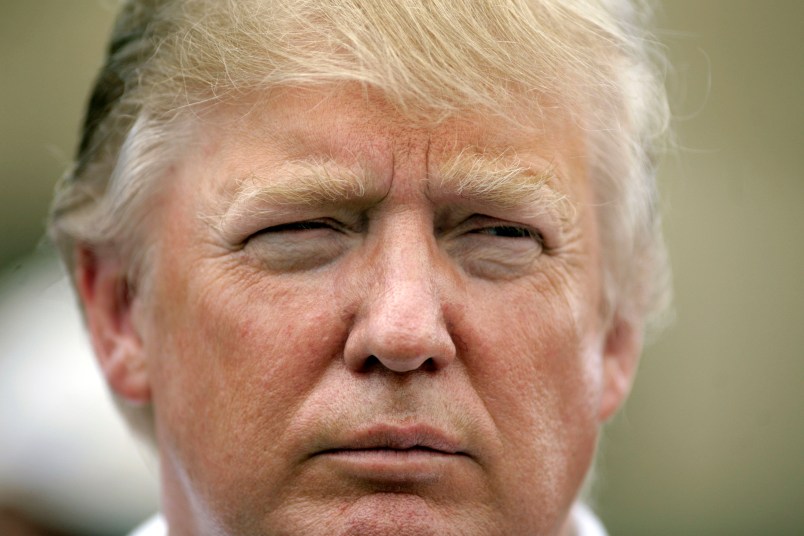Democrats love to talk about Republican voter suppression, and various ways, such as strict voter identification laws, that have been employed to keep Democrats from registering and casting effective votes. But ironically, the path to Democratic victory in November could be to adopt some methods to depress the Republican vote, specifically to encourage conservatives to stay home on Election Day or to vote for third party candidates. This may be an unsavory tactic but smart politics. The better long-run solution for Democrats is automatic voter registration, or even mandatory voting.
There’s a long tradition of trying to push down the turnout of one’s opponents. Back in 2010, Democrats and progressives denounced ads from a Republican front group, “Latinos for Reform,” which urged Spanish-speaking Latino voters “¡No votes!” (or “Don’t Vote”) in upcoming congressional elections. The ad’s pitch was that President Obama and Democratic voters had not done enough on immigration reform to deserve Latino votes and that these voters should stay home.
The ads seemed aimed at depressing Democratic turnout in congressional elections in order to help Republicans. The person behind Latinos for Reform, Robert de Posada, was a former official for the Republican National Committee who opposed President Obama’s immigration policies. The largest donor to Latinos for Reform was a non-Latino pro-life activist living in Southern California.
Democrats could easily follow a similar strategy in November. Republican and conservative voters have very negative views of Hillary Clinton, and it seems unlikely that any amount of advertising or persuading will get many of these voters to vote for her. But these same voters are ill at ease with Donald Trump, who has not always (and still does not always) take conservative positions on issues that these voters care about.
It is easy to imagine Democratic Super PACs and non-disclosing 501(c)(4) groups running ads aimed at these voters in swing states such as North Carolina, Florida, and Ohio highlighting Donald Trump statements indicating his earlier support for abortion rights and his current support for some of Planned Parenthood’s work; Trump’s comments on same-sex marriage and the rights of transgender people in the current disputes over bathroom access; and Trump’s views on taxes and the economy. Every conservative who stays home helps Democratic candidates.
Democrats also might run ads encouraging conservatives and Republicans to vote for conservative third party presidential candidates as a protest vote against Donald Trump and the direction of the Republican party. This too, is an old tactic that political operatives in both parties have used before.
In a 1986 Senate race for example, a supporter of California Democratic incumbent Sen. Alan Cranston spent $120,000 to produce ads for a right-wing third party candidate, in an effort to take votes away from Cranston’s Republican challenger, Ed Zschau. That third party candidate got more votes than the difference between Cranston and Zschau in the election that Cranston narrowly won.
Similarly, Republicans tried to help Ralph Nader get on the ballot in various states so that he could siphon votes away from Democrat John Kerry in the 2004 presidential elections. They tied themselves in knots trying to explain to the New York Times why they were supporting the left-leaning politician.
Surely many Democrats would justify efforts to suppress conservative turnout in order to achieve the larger goal of defeating Donald Trump for the presidency and electing a Democrat to office. But such tactics are in at least some tension with Democratic Party rhetoric about encouraging everyone to cast a meaningful vote.
In the long run, Democrats’ best political strategy is to push enfranchisement to its logical limits. A few states such as Oregon and California have moved to automatic voter registration. Eliminating the barriers to registering will make it easier to focus on get-out-the-vote efforts and insure that all eligible voters have a chance to vote.
A more radical solution is to adopt mandatory voting, which would require everyone to turn in a ballot, either in person or by mail. Mandatory voting does not force anyone to vote (it is perfectly acceptable to turn in a blank or spoiled ballot), but it would help Democrats who have trouble turning out voters, especially in midterm elections. Inertia is a huge force against getting more people of all parties (and no party) to vote.
Ultimately, we should have a system where all eligible voters have an easy path to cast a vote which will be fairly and accurately counted. That won’t stop all political maneuvering (such as pushing third party fringe candidates) but it would free up resources now spent on voter registration and turnout to making a positive case for the parties’ candidates.







Why bother?; Drumpf, himself, will depress voter turnout with evangelicals and true conservatives.
Completely ludicrous comparison.
One is using spin to suppress the opposition party’s turnout through creative advertising. Unsavory perhaps, but legal.
The other is using the courtroom via very strict, tailored voter ID laws to deny a particular group of people their due right to vote…which, if legal, is due to a SCOTUS oblivious to the realities of life in the USA.
Seriously? You’re suggesting that convincing voters that your opponent doesn’t represent their ideals is the same as using legislation to try to prevent people from registering to vote and/or voting?
Please, one of the TPM editors should go in and change the lede. It’s beneath a quality political publication like this.
discouraging demoralized opponents is a far cry from voter suppression
Jesus Christ and a Cracker, I can’t believe this shit is what passes for a TPM article today. Talk about false equivalency!